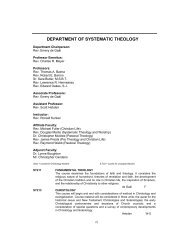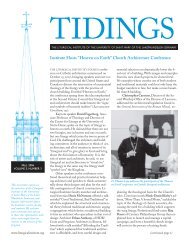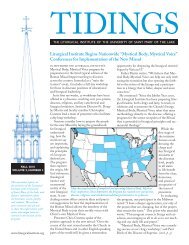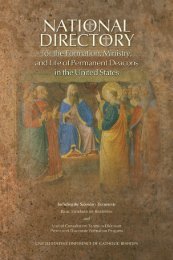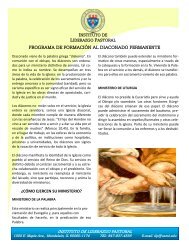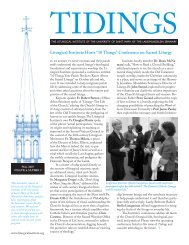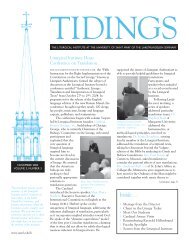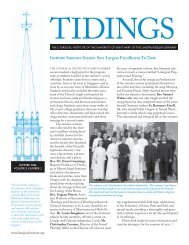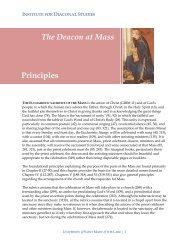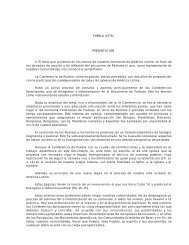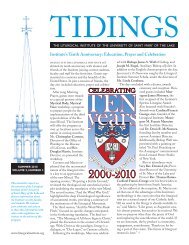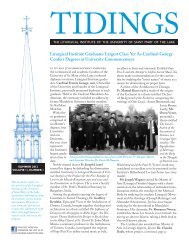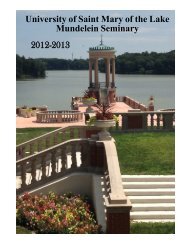Seminary and Graduate School of Theology - Mundelein Seminary
Seminary and Graduate School of Theology - Mundelein Seminary
Seminary and Graduate School of Theology - Mundelein Seminary
You also want an ePaper? Increase the reach of your titles
YUMPU automatically turns print PDFs into web optimized ePapers that Google loves.
BI358<br />
MIRACLES IN THE NEW TESTAMENT (SG)<br />
The course will concentrate on Jesus' miracles as presented by the Synoptic gospels<br />
(except for the miracle <strong>of</strong> the feeding <strong>of</strong> the crowd, which is also in John's<br />
gospel). We will begin by considering the philosophical problems with the miraculous<br />
(e.g., Hume) <strong>and</strong> the state <strong>of</strong> the question today. Then we will survey how<br />
theologians <strong>and</strong> philosophers have understood the significance <strong>of</strong> Jesus' miracles<br />
from the Early Church through the Middle Ages, the Reformation, <strong>and</strong> the Enlightenment.<br />
As we study the various miracle pericopes, we will also consider <strong>and</strong><br />
critique the approaches <strong>of</strong> modern historical-critical studies, especially in light <strong>of</strong><br />
more recent developments in exegetical approaches (e.g., sociological interpretation<br />
[Kee], literary interpretation, existential interpretation [Latourelle]). As we<br />
proceed, we will consider the questions <strong>of</strong> the historicity <strong>of</strong> the gospel stories as<br />
well as their theological <strong>and</strong> pastoral significance for various cultures <strong>and</strong> Christian<br />
communities today.<br />
Lodge<br />
F<br />
BI367<br />
PROTO-ISAIAH<br />
Isaiah, son <strong>of</strong> Amoz, at the inaugural vision <strong>of</strong> his call in the year <strong>of</strong> King Uzziah’s<br />
death (740 B.C.) was struck by the awesome holiness <strong>of</strong> God, whom he later<br />
called “The Holy One <strong>of</strong> Israel.” He witnessed the rise <strong>of</strong> the great Assyrian em<br />
pire under Tiglath – Pilser III (745 – 727), whose policies affected Israel <strong>and</strong> Judah<br />
tremendously. Working in very difficult times, he tried to rally the Kings <strong>of</strong><br />
Judah, (Ahaz, Hezekiah, <strong>and</strong> Manasseh) to obedience to Yahweh, but with little<br />
success<br />
Akpunonu W<br />
BI368<br />
EPISTLE TO THE HEBREWS (Pauline)<br />
The Epistle to the Hebrews can be ranked third among the great theological<br />
works <strong>of</strong> the NT – after the Gospel <strong>of</strong> John <strong>and</strong> Paul's Epistle to the Romans.<br />
Here the life <strong>and</strong> ministry <strong>of</strong> Jesus is reflected on by studying his priesthood. The<br />
author with remarkable originality <strong>and</strong> ingenuity used the life <strong>and</strong> the liturgy <strong>of</strong> the<br />
OT to prove that Jesus is Great High Priest, above the angels in the line <strong>of</strong><br />
Melchizedek, <strong>and</strong> superior to the Levitical Priesthood. He is the compassionate<br />
<strong>and</strong> trustworthy High Priest. (2 hours)<br />
Akpunonu S<br />
BI377<br />
GOSPEL OF LUKE (Pilgrimage)<br />
Our course will consider just the Gospel <strong>of</strong> Luke, even though Luke’s Gospel is<br />
only Volume One <strong>of</strong> a two-part work which includes the Acts <strong>of</strong> the Apostles. We<br />
will give some attention to the relationship between the two, but our main focus<br />
will be upon reading <strong>and</strong> responding to the gospel narrative. We will make three<br />
methodological assumptions. First, what did Luke intend to say to his original<br />
audience (including how he uses his sources)? Second, how does what he says<br />
compare with the other Gospels <strong>and</strong> the rest <strong>of</strong> the New Testament? Third, what<br />
is the “fuller” sense (e.g., anagogical, narrative, reader response)? Fourth, what<br />
connections can we make to living as disciples <strong>and</strong> evangelists today? All this<br />
means that we need to pay attention to the characteristics <strong>of</strong> Luke’s storytelling,<br />
especially to the order in which the author arranges his material. This will require<br />
that we do not (as we frequently do) treat each “event” or “pericope” in isolation,<br />
but in relation to what precedes <strong>and</strong> what follows.<br />
Lodge<br />
W<br />
70



